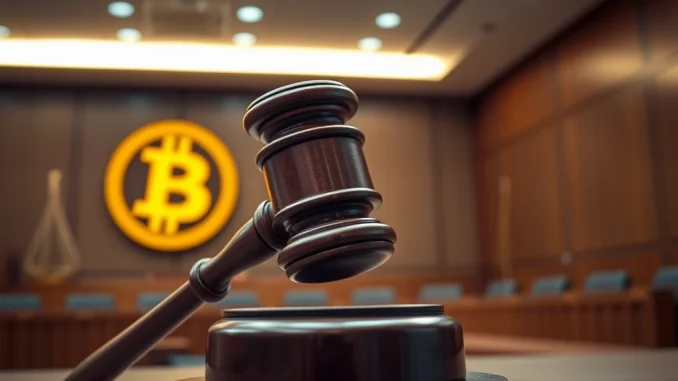
Is Binance facing even more legal heat? The latest development in the ongoing legal saga surrounding the cryptocurrency exchange giant reveals a significant shift. A U.S. court has decided to transfer a high-profile Binance lawsuit, initially filed in Washington, all the way to the Southern District of Florida. What does this dramatic court transfer mean for Binance, its founder Changpeng Zhao (CZ), and the wider crypto world? Let’s dive into the details.
Why Was the Binance Lawsuit Transferred to Florida?
According to a Cointelegraph report, U.S. District Judge Barbara Rothstein made the ruling based on the ‘first-to-file rule.’ This legal principle prioritizes the first lawsuit filed when multiple cases with similar core allegations are brought in different jurisdictions. In this instance, the Washington lawsuit, filed in August 2024, echoes the claims of an earlier case initiated in Florida back in June 2023. Both lawsuits accuse Binance of a serious offense: facilitating money laundering through their platform.
Judge Rothstein emphasized that consolidating these cases in Florida would prevent unnecessary duplication of legal proceedings. This move is designed to streamline the legal process and enhance judicial efficiency. Essentially, it’s about saving time and resources by dealing with similar accusations in one place.
What Are the Core Allegations Against Binance?
Both the Washington and Florida lawsuits center around the grave accusation that Binance allegedly enabled the laundering of stolen cryptocurrency. Let’s break down what this means:
- Facilitating Money Laundering: The lawsuits claim Binance knowingly or unknowingly allowed illicit funds, derived from criminal activities, to be processed through their crypto exchange.
- Stolen Cryptocurrency: The funds in question are alleged to be cryptocurrency that was illegally obtained, potentially through hacks, scams, or other illegal means.
- Lack of Due Diligence?: Implicit in these allegations is the suggestion that Binance may not have had adequate measures in place to prevent or detect money laundering activities on its platform.

Who Are the Parties Involved in These Lawsuits?
It’s crucial to understand who is bringing these legal challenges against Binance:
- Washington Lawsuit: This case was filed by three investors based in Washington. Notably, it also names Binance founder Changpeng Zhao (CZ) as a defendant, directly implicating him in the allegations.
- Florida Lawsuit: The earlier lawsuit in Florida was brought by a single investor, Michael Osterer. Interestingly, this case was actually ordered into arbitration in July 2024, suggesting a different legal path compared to the Washington suit.
What is the First-to-File Rule and Why Does It Matter?
The ‘first-to-file rule’ played a pivotal role in the court transfer decision. But what exactly is it, and why is it so significant in this context?
- Prioritizing the First Lawsuit: This rule is a judicial doctrine that dictates when multiple lawsuits are filed in different federal courts concerning substantially similar issues, the case filed first generally takes precedence.
- Avoiding Duplication: The primary aim is to prevent courts from wasting resources on handling the same legal disputes in multiple locations simultaneously.
- Judicial Efficiency: By consolidating similar cases, the first-to-file rule promotes efficiency within the judicial system and reduces the burden on both the courts and the parties involved.
In the Binance case, because the Florida lawsuit was initiated earlier and shares the same core allegations, the court deemed it appropriate to centralize the litigation there.
What Are the Potential Implications for Binance and CZ?
This Binance lawsuit transfer carries several potential implications for the crypto exchange and its founder:
- Consolidated Legal Battle: Binance will now face a consolidated legal challenge in Florida, streamlining their defense but also concentrating the legal risk in one jurisdiction.
- Increased Scrutiny: The transfer highlights the ongoing and intensifying regulatory and legal scrutiny faced by Binance, particularly concerning anti-money laundering (AML) compliance.
- CZ’s Direct Involvement: With CZ named as a defendant in the Washington suit (now moved to Florida), his personal legal exposure in this matter remains significant.
- Precedent Setting?: The outcome of this consolidated lawsuit could set precedents for how crypto exchanges are held accountable for potential money laundering activities on their platforms in the U.S.
- Reputational Damage: Continued legal battles and allegations of money laundering can negatively impact Binance’s reputation and erode user trust.
Navigating the Regulatory Maze: Challenges for Crypto Exchanges
The Binance lawsuit saga underscores the complex and evolving regulatory landscape that cryptocurrency exchanges must navigate. What are some of the key challenges they face?
- Global Operations, Fragmented Regulations: Crypto exchanges often operate globally, but regulations vary significantly across jurisdictions, creating compliance headaches.
- AML and KYC Compliance: Implementing robust Anti-Money Laundering (AML) and Know Your Customer (KYC) procedures is crucial but can be technically challenging and costly.
- Evolving Legal Definitions: The legal classification of cryptocurrencies and crypto exchanges is still evolving, leading to uncertainty and potential regulatory shifts.
- Balancing Innovation and Compliance: Crypto exchanges need to innovate and grow while simultaneously adhering to increasingly stringent regulatory demands.
- Maintaining User Privacy vs. Regulatory Transparency: Finding the right balance between user privacy expectations and regulatory demands for transparency is a constant tightrope walk.
What’s Next for the Binance Lawsuit in Florida?
With the court transfer complete, what can we expect in the next stages of this legal battle?
- Consolidation of Cases: The legal teams will likely work to formally consolidate the Washington case with the existing Florida lawsuit.
- Discovery Phase: Expect a period of intensive discovery, where both sides gather evidence, documents, and potentially conduct depositions.
- Potential Settlement Talks: It remains to be seen if Binance will explore settlement options to resolve the allegations and mitigate further legal costs and reputational damage.
- Arbitration in the Florida Case?: While the Washington case is now in Florida, the original Florida case was ordered to arbitration. How this interacts with the consolidated case will be a key procedural aspect to watch.
- Long Legal Process: Complex lawsuits like these can take considerable time to resolve, potentially stretching out over months or even years.
In Conclusion: The Shifting Sands of Crypto Regulation
The transfer of the Binance lawsuit to Florida is more than just a procedural move; it’s a powerful indicator of the intensifying legal and regulatory pressures facing cryptocurrency exchanges globally. As the industry matures, these legal challenges are likely to become more frequent and complex. For Binance and other crypto exchange platforms, navigating this evolving landscape with robust compliance measures and proactive legal strategies will be paramount to their long-term survival and success. The crypto world will be watching closely as this case unfolds in the Southern District of Florida.



